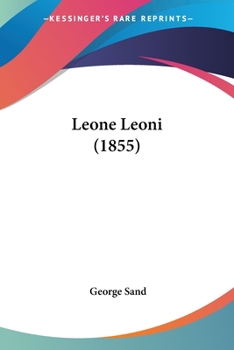Leone Leoni (1855)
Select Format
Select Condition 
Book Overview
Le livre Leone Leoni (1855) de George Sand raconte l'histoire d'un sculpteur italien du XVIe si�����cle nomm����� Leone Leoni. Leoni est un artiste talentueux et ambitieux qui travaille pour les puissants de son �����poque, notamment pour les rois d'Espagne et d'Autriche. Le roman explore les relations complexes de Leoni avec sa famille, ses amis et ses amants, ainsi que sa lutte pour maintenir son int�����grit����� artistique dans un monde de politique et de pouvoir. Le livre est une �����uvre d'art en soi, rempli de descriptions d�����taill�����es de la sculpture et de la vie en Italie ������ l'�����poque de la Renaissance. C'est une lecture captivante pour les amateurs d'histoire de l'art et de la litt�����rature classique.This scarce antiquarian book is a facsimile reprint of the old original and may contain some imperfections such as library marks and notations. Because we believe this work is culturally important, we have made it available as part of our commitment for protecting, preserving, and promoting the world's literature in affordable, high quality, modern editions, that are true to their original work.
Format:Paperback
Language:English
ISBN:1104260247
ISBN13:9781104260248
Release Date:April 2009
Publisher:Kessinger Publishing
Length:344 Pages
Weight:1.01 lbs.
Dimensions:0.7" x 6.0" x 9.0"
Customer Reviews
1 rating
THE BAD BOY ALWAYS GETS THE GIRL
Published by Thriftbooks.com User , 16 years ago
I was inspired to read this novel because of having recently seen the film "Children of the Century" (1999) about the lives of George Sand and Alfred de Musset. Much of the film is set in exotic Venice, and after the film ended, I wanted to learn still more about this pair of lovers, perhaps through a novel or an autobiographical work one of them had written. I chose "Leone Leoni" because it was easily available -- unlike "Lui et Elle" and "Elle et Lui," written by Alfred de Musset and George Sand, respectively, about their relationship to one another. What a lovely surprise to find that the setting for "Leone Leoni" is also largely set in Venice, exactly like the lavish 1999 film. Equally surprising, the character of Leone Leoni bears a striking resemblance to the character of Alfred de Musset depicted in the film as well. While I have little biographical material at hand to rely on, I do know that George Sand wrote "Leone Leoni" within one year of first meeting Alfred de Musset. In the novel Leone Leoni is seen as both noble and a card-sharp, aristocratic and deceitful by everyone who encounters him. The story is about Juliette's discovery of his character and her fatal, magnetic attraction to him despite his knavery. George Sand can really whip up an emotional storm of passion and narration that leads the reader into a journey with many sharp curves, only some of which can be predictably seen just up ahead, leaving the reader mostly astounded and surprised by what befalls the heroine and the anti-hero, Leone Leoni. Even more surprising, I noticed here in Sand's work a motif borrowed from Marquis de Sade's stories: malevolence cannot be countered by goodness or honor (though love, in this story, is equally as strong). The narrator is Bustamente, a lover and friend of Juliette, who listens to her tell her story about her desperate and passionate encounters with Leone Leoni from the beginning to the point where Bustamente finds her in terrible straits, all alone, nearly mad, and in need of rescue. It strains the modern reader's credulity a bit that Juliette can remember every single conversation she ever heard even while in states of half-sleep or trauma, the contents of every letter, the names of everyone she met, including the servants, over a period of years. But this straining at credulity was the only flaw I found in George Sand's otherwise powerful, narcotic-like tale of romantic immorality. "No woman has ever loved a man for his good character. She may respect him, admire him, be fond of him, but he is never the man for whom she will toss her bonnet over the windmills of the world." - "The Hussy's Handbook" (1942), Helen Brown Norden






